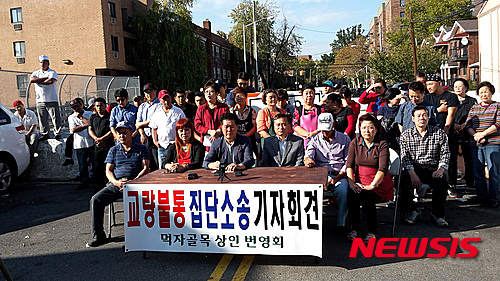- California Assembly OKs highest minimum wage in nation
- S. Korea unveils first graphic cigarette warnings
- US joins with South Korea, Japan in bid to deter North Korea
- LPGA golfer Chun In-gee finally back in action
- S. Korea won’t be top seed in final World Cup qualification round
- US men’s soccer misses 2nd straight Olympics
- US back on track in qualifying with 4-0 win over Guatemala
- High-intensity workout injuries spawn cottage industry
- CDC expands range of Zika mosquitoes into parts of Northeast
- Who knew? ‘The Walking Dead’ is helping families connect
Flushing Korean business owners affected by closed bridge to file lawsuit

A group of Korean merchants in Flushing’s food alley neighborhood are filing a class-action lawsuit as a result of damages suffered following the closing of a bridge in 2010. (Photo courtesy of Korean American Association of Queens / Newsis)
A two-lane Flushing bridge that has been blocked off for five years has spurred Korean business owners in the area to file a class-action lawsuit.
The site, located at 149th Street in New York City’s Koreatown, lies above a Long Island Rail Road heading into Manhattan.
The 30-meter bridge is situated between Roosevelt Avenue and 41st Avenue at the center of Murray Hill.
It connects to a food alley whose 60 or so businesses have seen sales damages since 2010, when the bridge was closed for repairs.
Another lawsuit is currently underway between the City of New York, which says inspectors found cracks in the bridge, and Gandhi Engineering, the construction company that the city accuses of faulty design.
Businesses in the area have taken a 30 percent hit in annual revenue since 2009, the Wall Street Journal reported in July.
According to WSJ, 70 percent of businesses in the area are owned by Korean immigrants.
A group of angered Korean business owners in the food alley area, members of the neighorhood merchants association, gathered outside the bridge last Thursday to declare a class-action lawsuit against the current construction company to receive compensation for the damages suffered as a result of the closing of the bridge.
The Korean American Association of Queens and the Korean American Parents Association of Greater New York were present in support.
Local politicians, including State Senators Ron Kim and Toby Ann Stavisky and City Councilman Peter Koo, have also thrown their support behind the effort.
“The closing of the bridge has given massive damage to all businesses in the food alley,” said Kim Young-hwan, head of the merchants group.
Kim said he is asking that building owners and others affected by the bridge, especially those who had to shut down shop and those who have lost significant revenue, come forward to the association with their stories.
The association plans to collect stories until next month, he said.
According to the association, there 22 businesses out of 60 in the area are Korean-owned restaurants. After the bridge closing, at least 15 businesses have closed.















